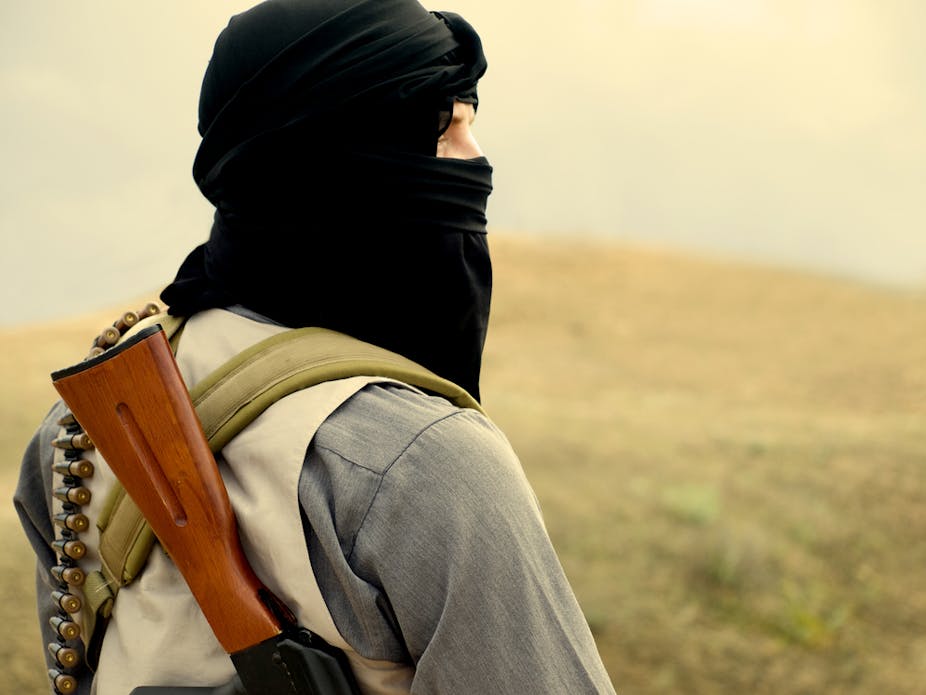Jihadist activity has been a primary source of concern for security agencies in the Western world for longer than a decade.
When contrasted against other broadly comparable countries, the threat to Australia from jihadist activity has been small. However, the threat has remained persistent over time.
While 33 individuals have been prosecuted for jihadist related activity in Australia, only two individuals have faced a charge of possessing literature which may facilitate terrorism without also being charged with being a member of a terrorist organisation or engaging in terrorist activity.
The first was in 2004 when Bilal Khazaal was arrested for combining editorial comment with existing jihadist literature to compile a document considered “likely to facilitate terrorism”. (Khazaal was convicted, released on appeal but jailed again in a second trial earlier this year.)
The document promoted methods of assassination for members of governments including America, Britain, Australia and other NATO countries and was published on an internet site endorsed by al Qaeda.
In the original sentencing, Judge Latham noted that whether or not Khazaal “was to engage in terrorist activity himself, entirely misses the point … literature of the type sourced by the prisoner is capable of, and has been shown to, foment terrorist activity”.
This week, a Melbourne man faced court charged with four counts of collecting documents being connected with preparation for, the engagement of a person in, or assistance in, a terrorist act. Reports say the man is seeking bail and plans to fight the charges in a contested committal hearing next year.
In contrast to the Khazaal case, these charges do not involve writing or compiling a document but more simply possessing documents which may facilitate terrorism.
The four charges relate to possession of four editions of the jihadist magazine Inspire and each offence carries a maximum 15-year jail term.
Inspire is a glossy English language jihadist magazine created by al Qaeda in the Arabian Peninsula (AQAP). AQAP has so far produced nine editions with issues 8 and 9 of the magazine released together in May this year.
Issue 8 was the last overseen by founding editor Pakistani-American Samir Khan before he and Anwar al-Awlaki were killed in a drone strike in Yemen. Though AQAP leaders pledged to continue the magazine’s existence post-Khan, a downgrade in quality was clearly evident in the latest edition, beginning with a blatant spelling error on the front cover of issue 9, altering the literal meaning of the title.
The magazine is designed to resonate with individuals who have limited religious knowledge but hold strong political convictions and a determination to act (a statement which describes the majority of jihadists in “western” countries).
In 2011 ASIO Director General David Irvine noted that the targeting of young, English-speaking Muslims is of particular concern to Australia and that Inspire magazine is “intended to resonate with a youthful, audience: the i-jihad generation. It sends them a simple message: "Jihad: just do it!”“.
A significant portion of each edition is dedicated to step by step instructional guides to bomb-making and weapons use. However, it goes further than traditional bomb-making guides such as the Terrorist’s Handbook, the Car Bomb Recognition Guide or The Vortex’s Cook Book which are simply instruction manuals.
Along with glorified stories of mujahedeen fighting internationally, there is also a strong ideological message delivered. It is this ideological component that makes the magazine particularly dangerous in an Australian context.
Historically, convincing a religious authority to sanction violence has been a serious impediment to those wanting to conduct an attack in Australia. Indeed, only one religious figure in Australia (himself only a self-proclaimed Sheikh) has sanctioned jihadist activity locally.
This distinct lack of figures granting authority has been one of the major factors preventing an act of terrorism in Australia. In 2009 a cell was identified as wanting to conduct a suicide attack at Holsworthy Army Barracks.
Yet, despite repeated efforts the group could not find a religious figure to sanction such an attack. Members were forced to attempt to contact al-Shabbab in Somalia to receive permission and this ultimately contributed to the cell’s identification and arrest. (Three men were found guilty of conspiring to prepare for or plan a terrorist attack and one man was acquitted.)
Inspire magazine provides a sanction to commit violence in western countries by publishing the writings and rulings of revered international jihadist figures such as Abu Mus’ab al-Suri and Anwar al-Awlaki. The magazine also promotes action. In edition one, the magazine encouraged "my Muslim brothers in the West is to acquire weapons and learn methods of war. They are living in a place where they can cause great harm to the enemy” (Inspire 1:17).
The following edition stated that “we strongly encourage our brothers to fight jihad on US soil. In fact even if travelling to join the fronts of jihad was accessible, we would still encourage them to perform operations in the West” (Inspire 2: 55).
Hence, the sum of Inspire’s propaganda effort is to portray countries such as Australia as a “legitimate target that may be attacked at any time without any further justification or authorisation required”.
The contents of Inspire magazine presses the very limits of what is acceptable when we promote freedom of speech or expression. If the charges in this current case are proven, it will provide the first instance in Australia where Inspire magazine has been connected to preparation for an act of terrorism.

